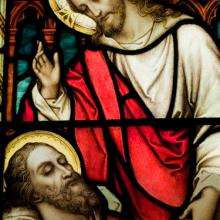deaf
IN HIS BOOK Where God Happens: Discovering Christ in One Another, Rowan Williams writes, “We are easily persuaded that the problem of growing up in the life of the spirit can be located outside ourselves.” In other words, we like to think if only it weren’t for a health problem or professional situation, our lives would be better. If we put off becoming the person we are called to be because we’re waiting for the “right” circumstance, then we won’t learn and grow. Even when circumstances need to change, we must find joy in the present.
This same lesson powers Darius Marder’s drama Sound of Metal, about a drummer, Ruben (Riz Ahmed), who’s suddenly affected with permanent hearing loss. Ruben’s journey underlines the importance of presence and its potential to foster spiritual growth. He must learn that the situation he is in presents an opportunity to embrace a new community and a more intentional life.

Lizzy Myers. Image via Media Network of Central Ohio / USA Today / RNS
Pope Francis is expected to meet a young girl from Ohio who dreams of seeing the pontiff in person before she loses her eyesight, according to a Catholic organization that supports sick and disabled pilgrims. Five-year-old Lizzy Myers from Bellville, north of Columbus, suffers from an incurable genetic disease known as Usher syndrome, which leads to blindness and hearing loss.
I just read the Sojourners blog, The Most Ignored and Undervalued People Within Churches Today, challenging churches to reach out to marginalized people. I was saddened but not surprised there was no mention of the exclusion of the largest group of people excluded every Sunday morning: those with hearing loss.
I have always considered myself “progressive,” ready to take up the cause of those in society that needed advocacy. While I was a pastor of a church, I worked toward making our building wheelchair-accessible and dreaming of the day when we could hire an ASL captioner at least once a month.
Yet in my naivety I believed that adult-onset hearing loss could be countered by a good hearing aid, allowing the user to have comprehension close to that of a person with “normal” hearing.
That misguided belief was tested five years ago when, at 63, I became deaf after knee surgery. It was seven months before I received a cochlear implant, but soon discovered it was inadequate for situations I would encounter daily: meetings, restaurants, movies and — most ironically — churches.
At the time, my spouse, Sheryl, and I were awaiting her ordination to find an area where we could continue our ministry. Life, however, had other plans. As we struggled to come to terms with the full impact of my initially devastating deafness, we learned a lot about being deaf that we did not know before I tumbled head first into the community of people with hearing loss.
When Jesus showed up, I think it’s interesting that he took that deaf man away from the THEY. He removes him from that system. He sticks his fingers in his ears and spits and touched his tongue and looks to heaven and the text says, he sighed. He looked to heaven and sighed. And the thing is, Jesus didn’t then rebuke the man or his deafness. He didn’t say, I cast out the demon of deafness. He just touched him, looked to heaven, sighed and said “BE OPEN."
It’s a wonderful statement for healing isn’t it? Be open.
It’s an image that’s stuck with me all week. This might sound weird but all week I kept picturing Jesus sticking his fingers in each of your ears and saying “BE OPENED." And then in the same daydream, before I could stop it, I pictured Jesus’ Holy and unwashed fingers in my own ears. He sighed he looked to heaven and he said, "Be opened." To which I said, “No thanks."


